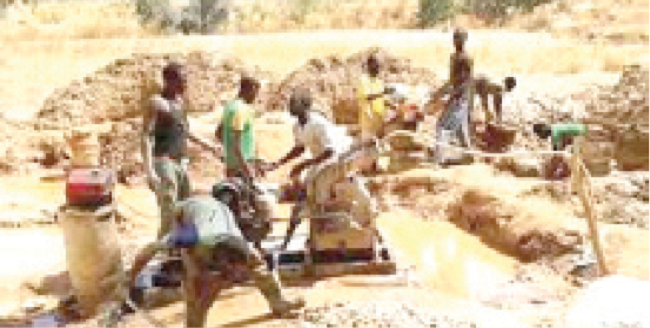After decades of profitable exploitation of solid minerals during the colonial era, Nigeria, since its independence, has failed to harness these resources for its own good. ‘LAOLU AFOLABI writes on the history of solid minerals sector and prospects for change in this piece.
NIGERIA is a rich country, blessed with abundant commercially-viable solid mineral deposits spread across its states. Before Independence, the colonial government exploited the country’s solid minerals and exported them in large quantities. There was, however, modest exploration and exploitation of coals, columbite and tin with intermittent growth up to 1960. These solid minerals contributed significantly to the economy until a decline began at the advent of the oil boom in the 1970s. The decline has continued till date as the sector continues to crawl and struggle.
The sector remains bedeviled by a number of problems, chief among which are shady dealings.
Previous reports by the Nigeria Extractive Industries Transparency Initiative (NEITI) revealed that with more than 50 minerals now in commercial quantities across the country, the solid minerals sector contributes less than one percent to the national GDP with more than 80 percent of mining activities (particularly artisanal mining) unregulated and their revenues unaccounted for.
Due to the global fall in price of oil and its international politics, the Nigerian government thought of diversifying the economy.
In the 1970s, the government had set an ambition to use iron ore and coal to produce steel for industrialisation. This was under the National Steel Development Authority (NSDA). Subsequently, this gave rise to Ajaokuta Steel Company, Delta Steel Company, Osogbo Steel Rolling Mills and others. Then, increased investments were made in the Nigerian Coal Corporation and Nigeria Mining Corporation for domestic use and for export of the excess.
However, the privatisation policy introduced by the Olusegun Obasanjo presidency led to further decline in activities of extractive companies, although there was an increase in exploration and exploitation of construction materials such as limestone and granite for cement production and infrastructure development of Nigeria.
The privatisation also brought an increase in foreign direct investment in exploration and exploitation of gold, iron ore, coal, gypsum, lead and zinc, tin and columbite, among others, leading to the Solid Minerals Roadmap of 2012 to add value to mining and processing.
The roadmap was re-launched in 2016 to ensure policy continuity and consistency in the sector, though not so much has been recorded as gains.
Total earnings from the sector since 2016 that the roadmap was launched up till the NEITI report for 2018 was only N5 billion.
About N1.6 billion was earned in 2016, N1.5 billion in 2017 from 59 companies and N1.9 billion from 69 companies in 2018.
This was corroborated by the Minister of Solid Minerals, Mr Dele Alake, during a press conference on the policy direction of the President Bola Tinubu administration in the solid minerals sector, as he said a significant and interesting fact is that the solid minerals sector that was exploited by the colonial government for export contributed 4.5 percent to Nigeria’s Gross Domestic Product (GDP) in the 1960s and 5.6 percent by 1980, but has accounted for less than two percent of Nigeria’s GDP last year (2022).
Instead of becoming an export commodity, Nigeria imports minerals such as iron ore, salt, with the value of solid minerals imports rising by 74.39 percent from N23.56 billion in the first quarter of 2021 to N41.09 billion in the same quarter in 2022.
Solid mineral imports were dominated by plasters of calcined gypsum or calcium sulphate imported from Turkey worth N6.87 billion and from China valued at N1.87 billion.
The NEITI’s maiden report which covered 2007 to 2010 revealed that over 70 percent of titleholders issued licences to mine by the Mining Cadastre Office are inactive companies, with only a few paying their annual fees and others such as royalties, taxes, permits, as stated in Nigerian Minerals and Mining Act 2007.
Another revelation is that out of about 3,163 companies granted 1,443 licences to mine during the period, just 30 percent engaged in active quarry, mining and exploration activities. Dominating the group are illegal miners, medium scale operators and artisan miners.
Total revenue yield from royalties paid by the major players between 2007 and 2010 was N2.2 billion; earnings from ground rents/annual surface rents was about N173.9 million; tax, N51.4 million and levies, N122.9 million.
Since there were no sufficient data or proper monitoring of the company, there was no way to assess the amount of solid minerals they produced, sold or utilised, therefore, royalty payment would be based only on what the operators disclosed to the regulators.
In the 2013-2014 NEITI report, total revenue from the solid minerals sector amounted to N33.9 billion in 2013.
Subsequent audit reports of 2015-2016 and 2017-2018 showed no significant improvement. The 2018 earnings from the solid minerals sector looked like the highest since 2007. The solid minerals sector contributed about N69.5 billion to the federation revenue.
Nigerian gold is found in the North-West, North-Central and South-West regions. The country currently has the 12th largest iron ore reserves stored in Kogi, Enugu, Niger, Zamfara and Kaduna states. The lead-zinc ores are usually together and are found in commercial quantities along the Benue trough, extending from Abakiliki in Ebonyi State through the middle Benue trough, to upper Benue trough in Bauchi State. Limestone is present in over 30 states of the federation, with the largest deposits found in the South-West and North-Central regions. Nigeria has bituminous coal with low sulphur and ash content and can be found in the North-East, North-Central and South-East regions of the country, yet there has been poor remuneration to the GDP.
Sites of conflict
One significant challenge at some of the locations of the solid minerals is conflict. In a bid to exploit gold deposits in Zamfara State, for example, there were conflicts with bandits and gunmen. The prospects are usually undermined by criminals who profiteer from the sector at the expense of vulnerable populations.
Most conflicts in Nigeria are attributed to location of solid minerals in such environment, even up to the lithium in Nasarawa State. According to a report by Maurice Ogbonnaya, Senior Research Consultant, Institute for Security Studies (ISS) Pretoria, South Africa, an estimated 80 percent of mining in the North West region is carried out illegally and on an artisanal basis by local populations. The mining of large untapped mineral deposits in the area, especially gold, which has strategic importance and economic value, is at the root of community violence. The government’s ban of artisanal gold mining in Zamfara State and across the region and the deployment of soldiers to enforce the ban since April 2019 yielded low results as illegal mining and its associated conflicts continued regardless.
Alake, during the press conference, asked: “How did a country with industrial, energy, metallic, construction and precious minerals, including gold, manganese, bitumen, lithium, iron ore, lead, zinc, limestone, uranium, columbite, baryte, kaolin, gemstones, coal, topaz, copper in massive proportions fail to use these resources to liberate the citizens?
“At the last count, our estimated reserves include gold (one million ounces); limestone (568 metric tonnes); lead/zinc, Barite 15 million metric tonnes; bitumen, 1.1 billion barrels; iron ore, three billion metric tonnes and coal. How did a sector with over two million operators, including over 633 small-scale companies and 251,500 registered miners, struggle to give the economy capital and human development?”
He listed inefficient geodata, weak implementation and enforcement, poor environmental, safety and health policies, fragility and conflict, unregulated artisanal mining, low technical capacity, lack of access to financing, weak inter-governmental and inter-agency coordination and weak federal/state relations over mining land as barriers to the development of the sector.
End in sight?
The immediate past administration headed by Muhammadu Buhari established the National Geodata Centre, Mineral Clinics, Nigerian Mining Sovereign Wealth Fund and passed into law the Nigerian Mineral and Mining Act of 2023. With those foundations laid, it is expected of the new administration, led by President Bola Tinubu and the supervision of the Minister of Solid Minerals, Dele Alake, to formulate and regulate prospecting, quarrying and mining, improve data gathering – monitoring and organised efficient sales, consumption of minerals and increased revenue accruable to the Federal Government from the issuance of permits, licences, leases and the collection of rents, fees and royalties.
To maintain focus, the Federal Ministry of Solid Minerals listed seven main minerals of interests, which are gold, coal, limestone, bitumen, lead, iron-ore and baryte.
This is because coal and iron ore are useful for steel production, one of the core agenda of the administration, including resuscitation of Ajaokuta Steel Rolling Mill.
Baryte will be helpful in oil and gas industry; gold has value addition without regards to jewelry making.
Bitumen and limestone will be useful for construction sector (real estate and infrastructure), especially in the use of concrete for road construction.
Actionable agenda
The ministry is seeking to establish the Nigerian Solid Minerals Corporation and also, a joint venture with mining multinationals. According to Alake, the defining characteristic of a serious mining industry is capital formation based on investment activity powered by precise geoscientific data that is transparent and accessible.
Nigeria must assert its presence in the mining sector by replicating its strategic positioning in the petroleum sector in setting up a corporate body that plays in this field. The administration will work towards the incorporation of the Nigerian Solid Minerals Corporation, a corporate body that will have subsidiaries doing business in the seven priority areas. The proposed corporation will seek and secure partnership investment agreements with multinational companies worldwide in order to secure foreign direct investment for the mining sector. The corporation will provide support for Nigerian businessmen seeking funding abroad and will also engage the Nigerian financial system, which has demonstrated reluctance to support mineral prospecting and mining because of the long-term gestation of value generation.
There is also the need for reliable and workable data on specific seven priority minerals and their deposits. A critical precondition for the real take-off of the sector is the gathering of precise geological data. The ministry is set to uncover the locations of minerals in each town or local government in the country. The Cadastral agency has elaborate data and a map depicting the areas of mineral deposits. Since an investor is not just interested in the location of a particular mineral, they want to know the quantum in depth and area before deciding on the cost and profitability, so the ministry is ready to establish a robust, precise, and accurate data internationally authenticated by the geoscience community and transparently published for easy verification and adoption. According to Alake, this will boost international investment.
As also stated by the minister, equally necessary precondition for investment in the sector is securing the investment environment, by reducing to the barest minimum, the massive presence of illegal miners.
Alake said the demographic, economic and security implications of their roles have encouraged, on the part of the government, the formalisation of their role by organising them into co-operatives registered by the government for the transition from illegal miners to artisanal co-operatives and markets, such as International Gemstone Market, Ibadan, Oyo State; Kaolin Processing Centre, Alkaleri, Bauchi State; Lead/Zinc Processing Centre, Ubulu, Abakaliki, Ebonyi State; Baryte Processing Centre, Ogoja and the Gold Souk, Kumbosto, in Kano State. With this realidation, the ministry has given 30-day grace to join a miners’ co-operative as, on the expiration of the period, the full weight of the law will fall on anyone seen on a mining site without a determinable status.
To stem illegal mining and enforce the 30-day ultimatum, the ministry is adopting a security regime which will become active in the solid minerals sector, including the mine police, sourced from the Nigeria Police and specially trained to detect illegal mining and apprehend offenders. There will also be mines surveillance security task force to coordinate the mines police and address high risk incidences of breach of mining laws.
In conclusion, there is the need for the equipping and training of professionals on modern mining technology and practice in a modern world. This was proposed by Alake, during his visit to the Minister for Mines and Petroleum, Energy, Corrective Services and Industrial Relations of the government of Western Australia, Bill Johnston, for the professionals to study in Western Australia, with the government’s support.







